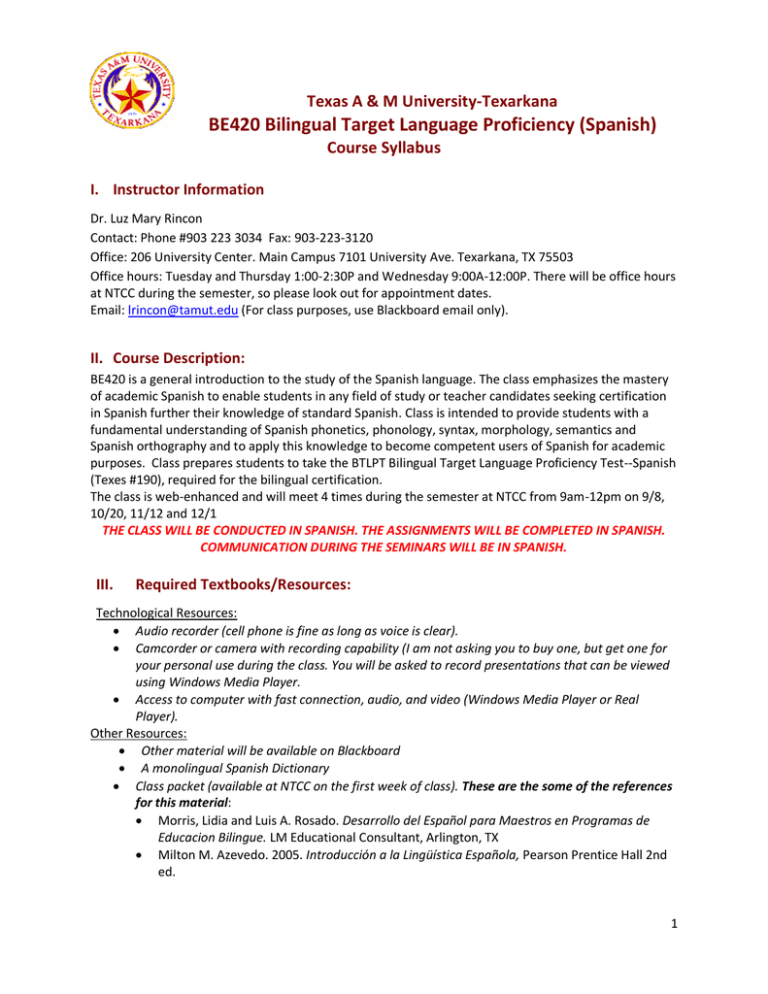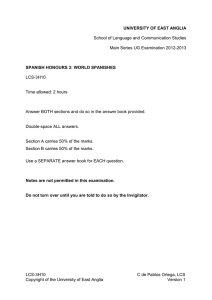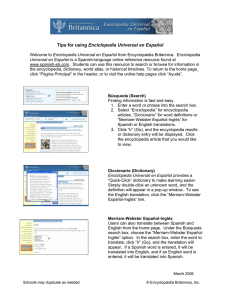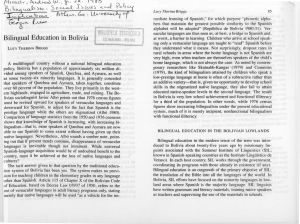BE420 Bilingual Target Language Proficiency (Spanish)
Anuncio

Texas A & M University-Texarkana BE420 Bilingual Target Language Proficiency (Spanish) Course Syllabus I. Instructor Information Dr. Luz Mary Rincon Contact: Phone #903 223 3034 Fax: 903-223-3120 Office: 206 University Center. Main Campus 7101 University Ave. Texarkana, TX 75503 Office hours: Tuesday and Thursday 1:00-2:30P and Wednesday 9:00A-12:00P. There will be office hours at NTCC during the semester, so please look out for appointment dates. Email: [email protected] (For class purposes, use Blackboard email only). II. Course Description: BE420 is a general introduction to the study of the Spanish language. The class emphasizes the mastery of academic Spanish to enable students in any field of study or teacher candidates seeking certification in Spanish further their knowledge of standard Spanish. Class is intended to provide students with a fundamental understanding of Spanish phonetics, phonology, syntax, morphology, semantics and Spanish orthography and to apply this knowledge to become competent users of Spanish for academic purposes. Class prepares students to take the BTLPT Bilingual Target Language Proficiency Test--Spanish (Texes #190), required for the bilingual certification. The class is web-enhanced and will meet 4 times during the semester at NTCC from 9am-12pm on 9/8, 10/20, 11/12 and 12/1 THE CLASS WILL BE CONDUCTED IN SPANISH. THE ASSIGNMENTS WILL BE COMPLETED IN SPANISH. COMMUNICATION DURING THE SEMINARS WILL BE IN SPANISH. III. Required Textbooks/Resources: Technological Resources: Audio recorder (cell phone is fine as long as voice is clear). Camcorder or camera with recording capability (I am not asking you to buy one, but get one for your personal use during the class. You will be asked to record presentations that can be viewed using Windows Media Player. Access to computer with fast connection, audio, and video (Windows Media Player or Real Player). Other Resources: Other material will be available on Blackboard A monolingual Spanish Dictionary Class packet (available at NTCC on the first week of class). These are the some of the references for this material: Morris, Lidia and Luis A. Rosado. Desarrollo del Español para Maestros en Programas de Educacion Bilingue. LM Educational Consultant, Arlington, TX Milton M. Azevedo. 2005. Introducción a la Lingüística Española, Pearson Prentice Hall 2nd ed. 1 Larry D. King and Margarita Suñer. 2008. Gramática Española, Análisis y Práctica. McGraw Hill Higher Education. Richard Barruta and Tracy David Terrell. 1982. Fonética y Fonología Españolas. John Wiley & Sons: New York. IV. Student Learner Outcomes (SLO): Content outcomes: BE420 A&M Texarkana students will… 1. Define the bilingual language proficiency standards and explain the relationship between these standards and the competencies that are evaluated by TeXes#190, BTLPT, one of the exams required for certification (Unit 1). 2. Demonstrate knowledge of Spanish academic Spanish by completing various activities in the fours language domains to enhace listening and speaking comprehension skills, reading comprehension skills and writing skills. 3. Demonstrate knowledge of Spanish morphology, phonology, syntax and other nuances of Spanish grammar by completing the required assignments. 4. Use correct spelling, orthography and punctuation in written discourse as demonstrated by writing samples. 5. Explain some of the most common errors produced by speakers of the substandard form and explain reasons for the importance of educated forms of the language in educational settings. 6. Produce writing samples, video and audio recordings to demonstrate the application of Standard Spanish in different situations and for different purposes in educational settings. Professionalism outcomes: BE420 A&M Texarkana students will demonstrate… 1. Appropriate attendance and promptness 2. Ability to meet deadlines 3. Positive, open attitude towards learning 4. Ability to utilize constructive feedback 5. Appropriate collaboration, organizational, presentation skills 6. Respectful attitude towards their professor and peers 7. Appropriate grammar, articulation, and speech patterns 8. Professional and ethical behavior V. Course Outline Unidad 1 Unidad 2 Unidad 3 Unidad 4 Unidad 5 Unidad 6 Unidad 7 El Español—historia y generalidades Fonética y Fonología del Español—los sonidos y los patrones de sonidos de la lengua Morfología del Español—la estructura de las palabras Sintaxis y Estructura del Español—los patrones de la oración Ortografía y Puntuación El Español Culto y el Español académico para maestros BTLPT y LOTE—exámenes para maestros VI. Course Calendar Weeks 1 and 2 Monday 8/27 - Friday 9/7 2 Unidad 1 El Español—historia y generalidades de la lingüística del español Readings: Materials available in the module Packet: 1 la lengua española en el mundo y 2 Lenguaje, lengua y lingüística Reading review #1: due Friday 8/31 at 8pm Reading review #2: due Monday 9/3 at 8pm Assignment: due Friday 9/7 at 8pm Seminar: Saturday 9/8 from 9am-12pm Weeks 3 and 4 Monday 9/10 – Friday 9/21 Unidad 2 Fonética y Fonología del Español—las consonantes, las vocales, los patrones de los sonidos y la sílaba Readings: Materials available in the module Packet: 3 Fonética Articulatoria: Las Consonantes and Características Generales de las Vocales en Español; Vocales y Sílabas; La Sílaba Reading review #1: due Friday 9/14 at 8pm Reading review #2: due Monday 9/17 at 8pm Assignment: due Friday 9/21 at 8pm Weeks 5 and 6 Monday 9/24 – Friday 10/5 Unidad 3 Morfología del Español—la estructura de las palabras Readings: Materials available in the module Packet: 4 Morfología —Forma y función de las palabras Reading review: due Friday 9/28 at 8pm Assignment: due Friday 10/5 at 8pm Weeks 7 and 8 Monday 10/8 – Friday 10/19 Unidad 4 Sintaxis y Estructura del Español—los patrones de la oración Readings: Materials available in the module Packet: 5 Sintaxis—la estructura de las oraciones Reading review: due Friday 10/12 at 8pm Assignment: due Friday 10/19 at 8pm Seminar: Saturday 10/20 from 9am-12pm Weeks 9 and 10 Monday 10/22 – Friday 11/2 Unidad 5 Ortografia y Puntuación Readings: Materials available in the module Packet: 6 Ortografía y Puntuación Reading review: due Friday 10/26 at 8pm Assignment: due Friday 11/2 at 8pm 3 Weeks 11 and 12 Monday 11/5 – Friday 11/16 Unidad 7 El Español Culto y Español Académico para Maestros Readings: Materials available in the module Packet: La norma lingüística hispana; Primeros Auxilios de la lengua; Elementos que afectan la ortografía; Vocablos educativos Reading review: due Friday 11/9 at 8pm Assignment: due Friday 11/16 at 8pm Seminar: Saturday 11/12 from 9am-12pm Weeks 13 and 14 Monday 11/27 – Friday 12/7 Unit 8 BTLPT y LOTE—Exámenes para maestros Readings: Materials available in the module Packet: Last unit Assignment #1: due Friday 11/30at 8pm Assignment #2: due Friday 12/7 at 8pm Video presentation to be posted through Wikki no later than 11/30 (viewing and peer comments to be finalized on 12/7 at 8pm) No reading review due this week Seminar: Saturday 12/1 from 9am-12pm Week 15 Monday 12/10 – Friday 12/14 BTLPT practice test to be taken no later than Thursday Dec. 14 (test available at the NTCC and the Texarkana testing center on 12/1) No reading review or assignments due this week VII. Grading Policies and Methods of Evaluation: Graded Components Mastery of Content SLOs Video project presentation (grading includes peer comments) 8 Assignments (10pts each x 8 assignments =80pts) 8 Reading Reviews (10pts x 8 reviews=80pts) BTLPT practice test result (listening, reading, writing, speaking) Mastery of Professionalism SLOs Attendance (4pts x 5 class sessions=20pts) Total Totals 10% 30% 30% 20% 10% 100% Final course grade will be an average of the points earned. Course grade will be assigned based on the following scale: 90-100% A 80-89% B 70-79 % C 60-69 % D below 59% F 4 Assignments: There will be 8 assignments, some of which are individual and others collaboration assignments. For some assignments, you will be assigned to a group. Each student will receive a given set of activities to do and will send it to her/his peer who will review it and make the necessary corrections. Students must start working on their assigned part as soon as the unit is opened so that they can review and provide feedback to their peers in the group before the deadline. Late assignments will not be accepted. TO POST THE ASSIGNMENTS USE THE HTML option and post it directly on the response window. PLEASE DO NOT USE ATTACHMENTS AS THESE SOMETIMES ARE NOT SUPPORTED BY THE SYSTEM. Attachments will NOT be considered and not graded. Reading Reviews: There will be ONE or TWO reading reviews per unit. The reviews are on the material in the module AND/OR in the packet. There is no review for the material in Unit 8. The reviews will be written in Spanish. It consists of a 2-3 page report of the key aspects in the readings, what new knowledge you acquired as a result of reading the class material. Create a word document to present your assignment and post it directly on the posting window. PLEASE DO NOT USE ATTACHMENTS AS THESE SOMETIMES ARE NOT SUPPORTED BY THE SYSTEM. Attachments will NOT be considered and not graded. Video project: This is a project that is linked to the last unit. The project will assess your ability to make academic presentations and your verbal ability in Spanish. You will record 3-5 minute presentations in Spanish and upload them to the Wikki links on Blackboard. Your peers and instructor will view them and offer feedback. You must make sure the presentation is viewable. The presentations are on different topics such as talking to a (pretend) group of administrators in your district about why instruction in the native language is essential and the role of ESL in bilingual education, talking during an interview about how the A&M bilingual program prepared you to be a good bilingual teacher, or presenting to a group of parents about the benefits of bilingual education and why their children should receive these services rather than English immersion. VIII. Educator Standards for EC-6 A. Bilingual Education Standards: The following Bilingual SBEC standards are addressed in the course. A full description of the standards and competencies can be accessed using the link below: http://www.sbec.state.tx.us/SBECOnline/standtest/standards/ec4biling.pdf Standard I. The bilingual education teacher has communicative competence and academic language proficiency in the first language (L1) and in the second language (L2). The beginning bilingual education teacher knows and understands: 1.1k how to read, write, and communicate orally in a proficient manner in L1 and L2; 1.2k academic language in L1 and L2. The beginning bilingual education teacher is able to: 1.1s prepare lessons, materials, and assessments in L1 and L2; 1.2s use academic language competently in L1 and L2 to deliver instruction; 1.3s communicate effectively (orally and in writing) with families, colleagues, and the 5 community in L1 and L2. B. Bilingual Target Language Proficiency Standards: The following SBEC BTLP standards are addressed in the course. A full description of the standards and competencies can be accessed using the link below: http://www.sbec.state.tx.us/sbeconline/standtest/standards/btlp.pdf Standard I. The teacher is able to derive essential information, interpret meaning, and evaluate oral communications in the target language. Standard II. The teacher is able to derive essential information, interpret meaning, and evaluate a variety of authentic materials written in the target language. Standard III. The teacher is able to construct effective interpersonal and presentational oral discourse in the target language. Standard IV. The teacher is able to write effective interpersonal and presentational discourse in the target language. IX. COURSE POLICIES Attendance: This is a web-enhanced class and, therefore, seminar meetings as well as participation in online discussion activities are mandatory. Arriving late or leaving before the class ends is unprofessional and disturbing. Participation: Students are expected to post all their assignments on the discussion board following the specific instructions for each assignment and maintaining discussion board etiquette: respectful communication with fellow peers and instructor and appropriate use of academic language. Students are expected to maintain active participation during seminar activities. Because this is an online class, students are expected to communicate with instructor and fellow students Blackboard tools: discussion page, email, and chat when members are available. Incomplete grades: University guidelines for the assignment of an "Incomplete" grade will be used to determine eligibility. In addition, an incomplete grade will be considered for students who have satisfactorily completed 70% of the course work and it will be warrant only under extreme circumstances. Cell phone or texting: The use of cell phone or technological devices for personal purposes is unprofessional and disturbing to the class members. Be considerate of others. X. UNIVERSITY POLICIES Disability Accommodations: Students with disabilities may request reasonable accommodations through the A&M-Texarkana Disability Services Office by calling 903-223-3062. Academic Integrity: Academic honesty is expected of students enrolled in this course. Cheating on examinations, unauthorized collaboration, falsification of research data, plagiarism, and undocumented use of materials from any source constitute academic dishonesty and may be grounds for a grade of ‘F’ in the course and/or disciplinary actions. For additional information, see the university catalog. COPYING OTHER STUDENT’S POSTINGS AND AUTHORING THEM AS YOURS MAY BE GROUNDS for a grade of ‘F’ in the course and/or disciplinary actions. 6 A&M-Texarkana Email Address: Upon application to Texas A&M University-Texarkana an individual will be assigned an A&M-Texarkana email account. This email account will be used to deliver official university correspondence. Each individual is responsible for information sent and received via the university email account and is expected to check the official A&M-Texarkana email account on a frequent and consistent basis. Faculty and students are required to utilize the university email account when communicating about coursework. Drop Policy: To drop this course after the census date (see semester calendar), a student must complete the Drop/Withdrawal Request Form, located on the University website http://tamut.edu/Registrar/droppingwithdrawing-from-classes.html) or obtained in the Registrar’s Office. The student must submit the signed and completed form to the instructor of each course indicated on the form to be dropped for his/her signature. The signature is not an “approval” to drop, but rather confirmation that the student has discussed the drop/withdrawal with the faculty member. The form must be submitted to the Registrar’s office for processing in person, email [email protected], mail (7101 University Ave., Texarkana, TX 75503) or fax (903-223-3140). Drop/withdraw forms missing any of the required information will not be accepted by the Registrar’s Office for processing. It is the student’s responsibility to ensure that the form is completed properly before submission. If a student stops participating in class (attending and submitting assignments) but does not complete and submit the drop/withdrawal form, a final grade based on work completed as outlined in the syllabus will be assigned. The student will be counted as non-attending/non-participating in class if the student has missed the first unit assignments, and therefore, will be subject to administrative drop. Student Technical Assistance: Office hours are: Monday - Friday, 8:00a to 5:00p. Contacts: Frank Miller 903-223-3156 [email protected]; Nikki Thomson (alternate) 903-223-3083 [email protected] For Blackboard assistance contact Julia Allen (903) 223-3154 [email protected] 7




